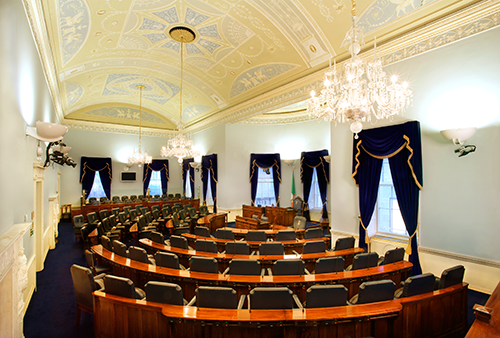A number of Southsiders were winners and losers in the recent Seanad elections.
Among the big winners was former Sinn Féin TD Chris Andrews who will now sit in the Seanad after losing his Dáil seat in December.
Andrews’ loss to Eoin Hayes in the Dublin Bay South election race was one of the big moments of the general election but Andrews has brushed himself off to win a seat in the Labour panel.
Fellow Southside Sinn Féin man Daithí Doolan and outgoing Senator Paul Gavan failed to win a seat in the same constituency.
The high-profile National University of Ireland race (which allowed UCD graduates to vote) saw former Southside Tánaiste Michael McDowell top the poll and Green councillor from Dún Laoghaire Eva Dowling placing fourth in the three-seater.
The Dublin University constituency (which allows Trinity graduates to vote) was dominated by the Greens, for all the wrong reasons.
A split vote between former Lord Mayor of Dublin Hazel Chu (who received 8.1% of first preferences) and former Minister Ossian Smyth (7.8%) saw the Greens throw away a seat – the combined Green vote was 15.9%, enough to win the final seat, but the split vote allowed independent Senator Aubrey McCarthy, co-founder of Tiglin, to take the final seat.
The Trinity panel saw Tallaght’s Lynn Ruane top the poll while disability advocate Tom Clonan took the second seat.
2025 will be the final year in which the two separate university constituencies elect six Senators; reform brought in by the last government, after a legal case was filed by a University of Limerick graduate, will see the next Seanad election feature a five-seater constituency where graduates of all third-level institutions can vote.
The Greens did see some electoral success in the Seanad with former minister Malcolm Noonan topping the poll in the Agricultural panel, while the election saw both Aontú and the Social Democrats win Seanad seats for the first time.
Labour lost out, failing to hold onto their seat in the Administrative panel.
South Inner City Councillor Darragh Moriarty failed to win in the seat held by Labour since the 1989 general election.
The election was a mixed bag for Labour, who started the 2020 Seanad term with five Senators (including future leader Ivana Bacik) and now have two seats to their name.
Sinn Féin’s high-profile gambit of running Stormont finance minister Conor Murphy paid off, with Murphy winning a seat in the industrial and commercial panel.
Sinn Féin now have a total of six Senators in the Seanad.
Despite coming out on top in November’s general election and remaining the largest party in last June’s local elections, the party’s discipline seemingly broke down with the party losing five seats in the Seanad.
Fianna Fáil did see some success on the Southside, with Tallaght councillor Teresa Costello making the leap from South Dublin County Council to the Seanad, but the proceedings were ultimately a disappointment for the party.
Fianna Fáil won 20 Seanad seats in 2020, but returned just 13 this time, tying them with Fine Gael.
After Taoiseach picks were taken into account, Fianna Fáil ended up with 19 seats and Fine Gael ended up on 18.
Fine Gael’s big loss on the Southside saw incumbent Senator Mary Seery Kearney lose the seat she held since 2020.
A Taoiseach nominee in 2020, Seery Kearney fought for re-election in the Industrial and Commerical Panel but was unsuccessful.
Independents were among the big winners in the new Seanad – the aforementioned McDowell walked to re-election in his race, while other high-profile independents such as Frances Black, Victor Boyhan and Eileen Flynn held onto their seats.
The Seanad will see more female representation over the next term; 20 of the 49 elected seats were won by women, a percentage of 40.8%, a stark contrast to the Dáil having 44 female TDs out of 174 (or 25.3%).
